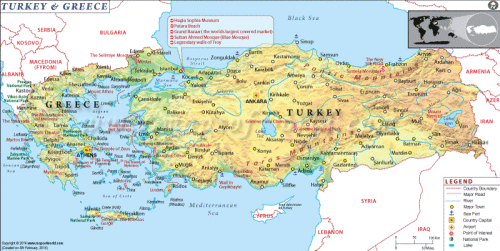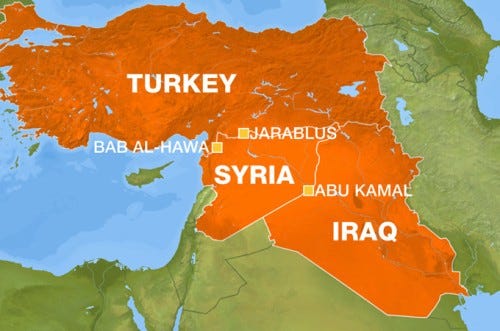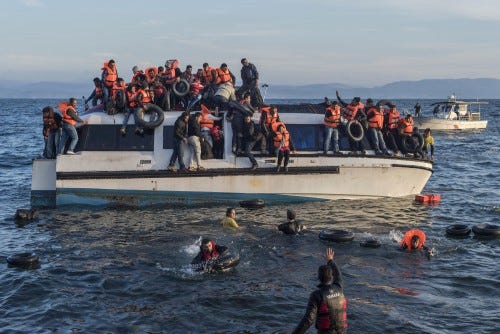How the Turkic Coast Guard Could Start a War
A tense situation surrounding migrants traveling in the waters of southeastern Europe has only gotten worse. The Turkic Coast Guard was filmed on March 12 attacking a dinghy packed with refugees some four miles off the coast of the Greek island of Lesbos, almost forcing the boat to sink. That incident, combined with anti-immigrant sentiment on Europe and the regional instability in southeast Europe and the northern Middle East, may be the first indication of a broader regional conflict to come.
The Turkic Coast Guard’s Actions Over the Past Week
A new deal between the European Union and Turkey that will send migrants who reach Greek shores back to Turkey went into effect on March 20. The EU has promised to take one refugee in the camps in Turkey for every one sent back. It’s a sort of tit for tat: every migrant they catch crossing illegally will free up space for one that has been waiting- assuming they pass the vetting processes in place and check out.
The EU-Turkic deal aims to close off the route between Turkey and Greece. Migrants launch from the Turkic coast and head off to the Greek islands. From there they travel north, finding refuge in Germany, France, and beyond. The route was responsible for upwards of 850,000 migrants entering Europe in 2015.
In the days leading up to the implementation of the deal, the Turkic Coast Guard said they “rescued” over 150 migrants lost at sea. Those who were “rescued” told a different story.
From the AFP:
In Turkey, around 200 migrants were caught off the coast and turned back as they tried to reach Greece before the deadline, a Turkish coastguard official said.
They were detained on a ship for 36 hours and were being held in a pen in the port of Dikili, where they pressed against the metal gates, chanting “We want to go! We don’t want to stay!”
“We were treated like animals on the big ship. They gave us no food or water,” a 19-year-old Syrian told AFP.
That treatment is in keeping with recent reporting from Alex Thompson for Channel 4 News. In the video below, Thompson shows the Turkic Coast Guard attack a dinghy off the Greek coast in what appeared to be an attempt to capsize the boat. The attack lasted close to 40 minutes and ended a mile off the coast of Lesbos.
In a separate incident, the BBC obtained video of the Turkic Coast Guard beating another boat with sticks:
Despite the obvious institutional antipathy towards the migrants, Turkey will take the refugees. The EU has promised to revisit membership talks with the country as a condition of the deal.
Entrance into the EU would benefit Turkey economically and politically. Economically, virtually uninterrupted access to the markets of Europe would be a massive revenue generator for the nation. Politically, acceptance into the EU would end Turkey’s pariah status among its neighbors in the north.
Whether or not those talks will truly be “re-energized,” as has been promised, the Turkic Coast Guard’s actions on March 13 are dangerous for regional stability. The Turkic Coast Guard, while pursuing the dinghy, ventured up to within a mile of the Greek coastline.
What Could Come
However, Greece and Turkey have a long history with one another. There have been invasions and occupations from both sides going back millennia. The longstanding feud between the two countries may be on hold for now, but what does the future hold?
Turkey is facing increased challenges from within as terror attacks become more frequent and the country tilts towards religious fundamentalism under the leadership of President Recep Erdogan.
Greece is politically unstable. The fascist party Golden Dawn is on the rise . A fascist Greece not only will be a very, very dangerous place for any migrants caught in the country when such a transition were to happen, it also would almost certainly be hostile towards Turkey.
Turkey, caught between a suddenly suspicious and belligerent Greece and the insistence of a promising EU, might throw caution to the wind and continue patrolling for migrants in Greek waters. If the Turks made the calculation that provoking the Greeks in the short term would pay dividends with the more powerful central-western European nations that make up the power center of the EU, one incident would be enough to provide the two nations with the justification of declaring war.
In that scenario, the conflict that began in Syria in 2011 would stretch into Turkey. Turkey would be beset on the north and south by Greece and Syrian militants respectively. The Kurds could use the opportunity to break away and join their people in northern Iraq and Iran. The Islamic State could potentially increase its territory into southern Turkey, at least temporarily.
Because both Turkey and Greece are members of NATO, the US and its allies in the treaty might, in an unlikely move, determine one nation as the aggressor and invoke Article One. However, it is more likely that NATO would remain neutral between Greece and Turkey, but act to stop the Islamic State from taking advantage of the chaos in southern Turkey. This could be seen as a full scale invasion of Syria, providing Russia with the excuse to send in ground troops…. and on and on. The battleground could conservatively extend from the Balkans to Kuwait.
The migrant crisis in Europe is causing many problems for the world’s political and security future. The preceding hypothetical war situation, based on the current reality on the ground in Turkey and Greece, shows how a broader regional conflict could be sparked by one Turkic Coast Guard incursion into Greek waters on the behalf of the EU.







